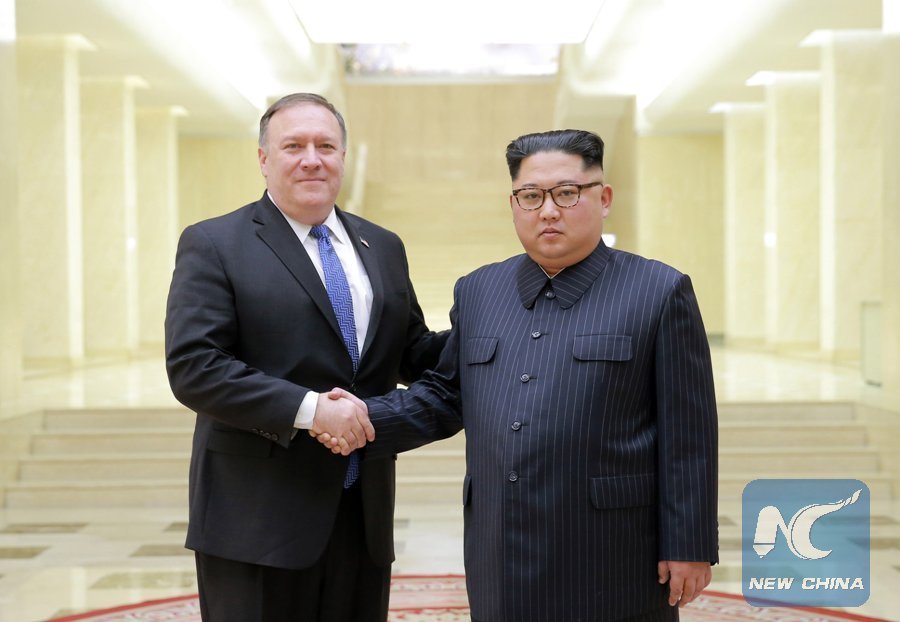
Photo provided by the Korean Central News Agency (KCNA) on May 10, 2018 shows Kim Jong Un (R), top leader of the Democratic People's Republic of Korea (DPRK), shaking hands with visiting U.S. Secretary of State Mike Pompeo on May 9, 2018. (Xinhua/ KCNA)
WASHINGTON, July 5 (Xinhua) -- It remains doubtful what substantial progress the visit by U.S. Secretary of State Mike Pompeo to the Democratic People's Republic of Korea (DPRK) beginning Friday will make on the Korean Peninsula's denuclearization, U.S. experts said.
His trip, the third in some three months, is mainly intended to implement the results of the June 12 meeting in Singapore between President Donald Trump and the DPRK's top leader Kim Jong Un.
"On this trip I'm seeking to fill in some details on these commitments and continue the momentum towards implementation of what the two leaders promised each other and the world. I expect that the DPRK is ready to do the same," Pompeo said after arriving in Pyongyang.
However, analysts said that a lack of trust and specific initiatives of the two sides would make his mission a tough one.
POMPEO'S TRIP
The White House and State Department on Monday announced Pompeo's travel plan to the DPRK on July 5-7. The trip, the first of its kind since the Trump-Kim meeting, has "at least a day and a half of meetings planned, depending on how the schedule goes."
The State Department said that during his stay in Pyongyang, Pompeo will "continue consultations and implement the forward progress made by President Trump and Chairman Kim in Singapore."
However, Pompeo's mission reportedly remains unsettled even before his leaving.
Earlier on Sunday, Trump's national security advisor John Bolton said Washington has a plan to dismantle majority of Pyongyang's nuclear and ballistic missile programs in a year, and that Pompeo will discuss this with Pyongyang during his visit.
The State Department has said it will not provide a timeline for Pyongyang's abandonment of nuclear and missile program.
Spokesperson Heather Nauert said Tuesday, "We're continuing our conversations and also our consultations with the North Korean government about what the president and what Kim Jong Un agreed to at the Singapore summit."
Tong Kim, a fellow at the Institute for Corean-American Studies (ICAS), wrote on July 1 in The Korea Times that Pompeo expects "to work out the details of how to proceed on the denuclearization process" while in Pyongyang, and "once the follow-up talks begin, a lower working level negotiation may complement the ministerial talks, as the negotiations will deal with highly technical details."
Daryl G. Kimball, the Executive Director of the Arms Control Association, said on July 1 that with Pompeo's first order of business would be "to agree on a framework for ongoing, direct, expert-level negotiations on the details and time frame for action-for-action steps."
The process could be coordinated through high level with the participation of relevant parties, he said. "An early goal should be to reach a common understanding, in writing, about what denuclearization entails."
CHALLENGES AHEAD
U.S. analysts argued that Pompeo faces a tough mission of making tangible progress after Trump met with Kim, and a mutual strategic mistrust.
A recent article by Vanity Fair argued that "part of the problem is a total lack of agreement over the terms of denuclearization."
ICAS's Tong Kim noted that "for North Korea to agree on any specific road map, it will be required to address the complicated relevant issues -- such as security guarantees, a peace regime, and a normalized relationship to the satisfaction of North Korea, as they go down the road toward the ultimate state of denuclearization."
"Provision of benefits can and should be built in an overall phased process" of the Peninsular denuclearization, he said.
Joseph Yun, former U.S. special representative for the DPRK policy, was quoted by Nikkei Asian Review as saying that "You only have a timeline if you know what the object is. (But) there is no fundamental trust. And it makes (the negotiations) so much harder."
NEXT STEP
In efforts towards denuclearization and lasting peace on the Korean Peninsula, China has proposed a "dual-track" approach, urging both Washington and Pyongyang to meet each other halfway.
ICAS's Tong Kim noted that the Trump administration "has become realistic to seriously consider the acceptability of 'a phased and synchronized approach,'" as "Washington no longer demands immediate and total denuclearization upfront."
Suzanne DiMaggio, from Washington D.C.-based think tank New America Foundation, predicted "a long process" ahead, saying "Arriving at a detailed plan for next steps should be the priority for U.S. negotiators."
"There will be milestones along the way that will need to be certified by outside observers. It remains to be seen how that process will take place," Darrell West, senior fellow at the Brookings Institution, told Xinhua.
Kimball, of the Arms Control Association, said on July 1, "Comprehensive denuclearization will take years," suggesting that Washington give Pyongyang "formal security guarantees, including a commitment not to initiate the use of force against one another, and a hotline agreement to help avoid miscommunication in a crisis," as well as the removal of U.S. strategic bombers and offensive-strike assets from any future joint military exercises with South Korea.
"Success is far from guaranteed. Yet, the pursuit of disarmament diplomacy with North Korea is far better than the alternatives," he added.

